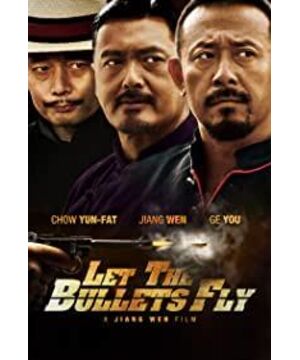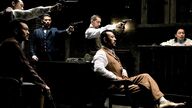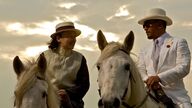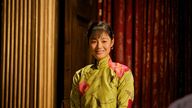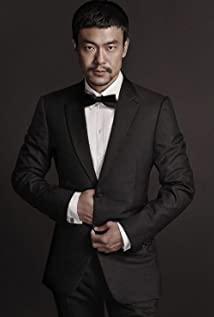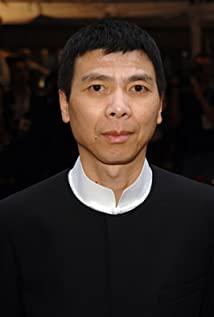Recently, "Youth as a Younger" has become a big hit. This film exposing campus bullying was tragically withdrawn due to "technical reasons", and it was urgently withdrawn three days before its release. Interestingly, this time it was suddenly set three days before the release.
Yi Yang Qianxi really impresses me. It seems that there are still many people in the Xiao Xianrou camp who speak with acting skills. Zhang Yixing in "A Good Show", Li Yifeng in "Animal World", and Yi Yang Qianxi this time, I may be a little too subjective to my previous impression.
In fact, it's not just them. Now almost all the little fresh meats want to use their acting skills to prove that they are not just a vase. This is a good thing. The mainstream values have been slowly pulled back.
Having said that, it seems that the urgent decision of "Youth as a Younger" has something to do with the withdrawal of "Once Upon a Time in Hollywood", because Mr. Quentin slapped with both hands: it's too much, so all these things happened.
No, why does Quentin sound like Jiang Wen? I thought that I might have smelled the "Let the Bullets Fly" that we are going to talk about today.
Jiang Wen is an iconic figure in the Chinese director industry, and his strong and unique personal film style has gained a large number of fans, and Quentin is one of them.
Before that, directing wasn't actually his first career.
Jiang Wen was also a "dead man" before he became a director. "Red Sorghum" really made him famous.
"Red Sorghum" is Zhang Yimou's directorial debut. Director Zhang must have had a rough outline of the character at the beginning of the formation. But Jiang Wen is also a ruthless man: I feel that your portrayal is wrong, you have to listen to me.
In this way, the two began to quarrel from the beginning of filming, and continued until the end. Unexpectedly, they ended up quarreling with a masterpiece that caused a sensation in the world.
"Red Sorghum" won major domestic and foreign heavyweight awards that year, and the full vitality of the film also had a profound impact on Jiang Wen's future career as an actor and director.
In the following years, Jiang Wen has been exploring his own path and secretly preparing his directorial debut, holding back his breath and wanting to be a blockbuster. Then, "Sunny Days" came out.
The film won 6 awards and 8 nominations at the 33rd Taiwan Golden Horse Awards. The starring Xia Yu won the title of Best Actor at the Venice Film Festival, and Jiang Wen also became a domestic first-line director.
Jiang Wen was not complacent, and then two works, "The Devil Is Coming" and "The Sun Also Rises", came out one after another.
Jiang Wen has never lacked talent, what he lacks is the restraint of talent. The styles of these two works are very different, making it difficult for the audience to believe that they are from the same director.
However, although "The Devil is Coming" is highly praised internationally, it is banned from being released in China; although "The Sun" shows his talent against the sky, ordinary audiences simply don't understand what he wants to express. Therefore, the two films The film made Jiang Wen lose money.
Therefore, there was this "Let the Bullets Fly", which made Jiang Wen stand and earn money.
After "Let the Bullets Fly" was released in 2010, it has achieved great success both at the box office and in the critics, and finally won a box office of 670 million. Jiang Wen has also become a well-known gold medal director.
In this film, Jiang Wen did not give up his expressive desire and strong style this time, but hid it in the story frame of the battle between the two heroes, plus the jokes that run through the whole film, making people who like commercial entertainment films and Audiences who like to dig deep can get what they want.
"Outside the pavilion, beside the ancient road, the grass is blue and green", accompanied by a nursery rhyme, the film began.
Clang clang clang... Two carriages came from afar, pulled by more than a dozen horses. Ma Bond, who had just bought a county magistrate, ate hot pot and sang songs with his wife and master. Not to mention how comfortable this life was. But what he didn't expect was that his team had already been targeted by the famous hemp bandit Zhang Mazi. Hearing six gunshots, the reins of the carriages and horses were broken one by one, and the bandits shouted and ran towards the prey in front of them.
As can be seen from the prologue at the beginning of the film, this is a film that can make male hormones soar. Excessive hemp bandits, fast editing shots, speeding trains and horses, Jiang Wen has already started racing!
The plan of the hemp bandits went very smoothly, and they were all experts in the robbery. In the end, the master drowned, and Ma Bond pretended to be Master Tang to save his life. Unfortunately, Feng Xiaogang, who played the master, killed Qing in 5 minutes.
Under the instigation of Master Tang, Zhang Mazi pretended to be the county magistrate and took his brother to take office in Goose City. Another point worth mentioning here is that the "Iron-Blooded Eighteen Stars" guarding Ma Bond on the carriage were actually the heroic team of the Wuchang Uprising, but they escorted a corrupt official here, implying that the society has fallen into a morbid state.
However, why Goose City is called Goose City has always been a question. Netizens analyzed this: Goose is my bird. Jiang Wen wants to say that I am a director with birds. emmm,,, you are right before the director scolds you. In fact, the real reason is not that simple. Let me sell a little bit here, and I will talk to you about my thoughts after finishing the video content.
The Goose City in Master Tang's mouth is surrounded by water, like a utopia isolated from the world, but soon they found that it was not as isolated from the world as they imagined, just because there was an evil dragon entrenched in the city - Huang Shilang, a tyrant in the southern country. .
When the county magistrate took office, Huang Silang ordered Hu Wan, the big housekeeper, and Wu Zhichong, the coach of the group, to bring a hat to the new magistrate, representing a condescending humiliation.
The name Wu Zhichong is very interesting. His strong martial arts correspond to Hu Wan's multi-dimensional and exquisite heart. The two are Huang Shilang's right-hand man.
After entering the city, Huang Shilang saw that the new county magistrate killed Li Wei, and realized that this might be a ruthless man, at least not one kneeling to beg for food. At this time, Zhang Mazi also learned from Master Tang that Huang Shilang was in control of half the Republic of China's tobacco business, and learned that the other party was also a stubborn man.
In this way, the chapter of the battle between the two heroes officially kicked off.
First of all, Zhang Mazi made the move first. He found an opportunity to humiliate the coach of the group, which was equivalent to throwing the gauntlet on Huang Shilang's face. Huang Shilang is not a soft persimmon either. He instigated Hu Wan to frame Xiao Liuzi. Xiao Liuzi was young and vigorous, and Wu Zhichong was beside him to help fuel the flames, and he accidentally ended his own life.
At this time, Zhang Mazi rushed over, and his anger had almost made him lose his mind. He desperately wanted to shoot Hu Wan with one shot, but the master told him to put down the gun with four words: kill and punish.
You have killed Hu Wan, or even killed Huang Shilang. You have to disintegrate all his forces and nail Huang Shilang to the pillar of shame. This is what a revolutionist needs to do. .
Yes, a revolutionary, Zhang Mazi is a revolutionary of the times. Zhang Mazi, who left Hu Wangou's life behind, can now attack and defend, just waiting for Huang Silang to make a move. Huang Silang did not let him down, and started the first step of "treating guests, beheading, killing chickens and eggs": Hongmen Banquet.
The scene of this grand banquet lasted for ten minutes. Jiang Wen did not express the psychological activities of the three characters according to the traditional photographic technique of fighting back and forth. Instead, he set up a circle around the three of them. camera. This form of photography can make the still images move, allowing the audience to be in a more comfortable atmosphere, and it also implies that the two heroes are still at the stage of testing each other.
At this time, Huang Shilang suddenly threw a depth bomb, saying that Zhang Mazi was in Goose City at the moment, and he had seen Zhang Mazi in 20 years, and the rotating camera stopped abruptly.
Zhang Mazi's biggest reliance is that he is in the dark. No one knows that he is Zhang Mazi, but Huang Shilang's words scared him a lot.
The following dialogue contains a lot of information, Jiang Wen is hiding his desire to express in this dialogue.
First, the question of time. Jiang Wen cleverly hid the time in every little detail. Before, the master said that the previous county magistrates had received the tax from Goose City for 90 years, that is, 2010. In other words, it was 1920, and Huang Shilang met Zhang Mazi 20 years ago, that is 1900, but when did they meet? As explained later, Zhang Mazi followed General Songpo (Cai E) at the age of 17, and 1900 was when General Cai E returned from Japan to participate in the "Self-Reliance Army Uprising".
Zhang Mazi, also known as Zhang Muzhi at the time, became the captain of the Cai E pistol team that year, and followed him to Japan after the failure of the revolution.
Japan, this is also a very important message. Before the banquet started, Huang Shilang said that if someone confessed to him, he would cut himself to death, and let Zhang Mazi be his Jiecuo person, and Zhang Mazi seemed to be very knowledgeable, saying that Jiecuo people generally used long swords. Change the knife. Incision is a kind of Bushido culture in Japan, but in order to avoid pain, generally after the first incision is made in the abdomen, a friend or a trusted retainer will immediately make an additional incision and cut off the head of the incisor.
The person who makes up the knife is called the wrong person.
Not to mention it was 1920. Now that the Internet culture is so developed, there are still many college students who are not familiar with the name Jiecuoren. In addition to the last "Daiyu Qingwenzi", Jiang Wen has almost told you by pressing your neck. : These two are definitely not normal! It's not hard to see that both are particularly familiar with Japanese culture, but is this something a common bully and bandit should know?
Combining the experience of General Cai E, it can be seen that the meeting between the two is likely to be in Japan, but Zhang Muzhi is in the light, and Huang Shilang is in the dark.
So what kind of person is Huang Shilang? Note that in the Hongmen Banquet, Huang Shilang mentioned that he was only running errands for Liu Dutong. Liu Dutong here is actually Liu Menggeng, a statesman during the Beiyang government and one of Cao Kun's most effective assistants. Do you remember the mine that killed Master Tang in a later episode? "I don't know about the northern country, but in the southern country, there are only two such collector's mines, MADE IN USA, 1910." This mine exploded the first one during the Revolution of 1911 (1911). The models are all so familiar, and this kind of revolutionary stuff isn't something that money can buy.
Then there is only one answer, he was once a core member of the Xinhai Revolution!
If you think this explanation is a bit far-fetched, you can recall what he said to Sister Hua: Don't become a Xiaofengxian. Xiao Fengxian was a famous prostitute in the past, and later fell in love with Cai E (yes, he was also related to Cai E), and helped him escape Yuan Shikai's house arrest.
Huang Shilang used Xiaofengxian to knock the mountain and shake the tiger, and the tone he used was definitely not respectful, so if he participated in the revolution in those days, he would definitely not belong to Cai E's faction, but he also stayed in Japan.
Okay, that's all the information, let's start looking at it.
In 1900, Zhang Muzhi followed Cai E to Japan, and had a relationship with Huang Shilang. From 1900 to 1911, Zhang Muzhi and Huang Shilang had the same revolutionary goal, but they did not belong to the same revolutionary camp and had no intersection. On October 10, 1911, the Wuchang Uprising broke out and the Revolution of 1911 officially started, of which Huang Shilang was the core member. On October 30, Cai E launched the Double Nine Uprising in Yunnan in response, and Zhang Muzhi was also a core member.
However, after the victory of the Revolution of 1911, Huang Shilang, who was once a revolutionary, began to use his power to make money. After becoming Liu Menggeng's lackey, he worked hard with his hometown of Goose City as the foundation, and controlled the tobacco and soil trade of the Republic of China. After Cai E died in Japan in 1916, Zhang Muzhi was gradually disappointed with the current situation and became disheartened.
Four years later, Zhang Mazi and his group robbed the team of county magistrates protected by the "Iron-Blooded Eighteen Stars", and finally this duo battle was fought. At this time, Huang Shilang pointed out the most crucial sentence: at that moment, at this moment.
These two people respectively symbolize the two roads of modern Chinese history. These two roads finally intersected in this place called Goose City, collided, and finally died. The Goose City in the film is surrounded by water. In fact, Jiang Wen is implying that this is a miniature specimen of the Republic of China, and it is a reincarnation of the times. Therefore, Zhang Mazi decided to cancel tonight's assassination after learning about the origin, and he was going to kill people!
Huang Shilang gave him two diamonds the size of pigeon eggs, but secretly let his subordinates pretend to be hemp bandits to attack the county magistrate. Unexpectedly, Zhang Mazi ran to take the words of the master this night. After recovering a small life, he found that the leader of this group was Hu Wan. He had been playing eagle all his life and was almost blinded by the eagle. Seeing Master Tang crying while holding his wife's body in the house, Zhang Mazi had another plan.
The next day at his wife's funeral, Zhang Mazi arranged for his brothers to kidnap Huang Shilang and the leaders of the two major families, and lay on the buttery grass thinking that he was done. However, Huang Shilang kept his hand, and the kidnapped was just a double. Although Zhang Mazi received ransoms from the two major families, he was very upset that he did not kill Huang Shilang, and finally decided to distribute the money to the poor in the name of the Ma bandits. His ultimate goal was to bring down Huang Shilang.
After that, there were two scenes in which the hemp bandits gave money and the fake hemp bandits made trouble. In the end, the two gangs met with four-tube hemp bandits, and a thrilling shootout began. (The feathers on the head of the real hemp bandit, look carefully)
There was a hail of bullets outside, but it was also heart-wrenching inside. Weasel, oh no, Huang Shilang is like a poisonous snake, every word is paralyzing Master Tang's nerves, and when his last line of defense is about to be defeated, a piece of news becomes the last straw that breaks the camel's back: the city's gangster rush , six people died, our people are safe and sound! There was lightning and thunder outside the house. Huang Shilang confidently lifted the white cloth of the deceased. Unexpectedly, he saw Hu Wan's group who had been sent to assassinate the county magistrate, and he was bitten by a poisonous snake.
"Hu Wan is the hemp bandit; the hemp bandit is Hu Wan! Killing the magistrate's wife, kidnapping the tycoons, and harming the people of Goose City is the Hu Wan of your master Huang's family!"
Huang Shilang is now at a loss to argue, and he has proved his identity as the leader of the bandit. In the end, he was forced to help, so he still took out 1.8 million taels of silver and let Zhang Mazi go out of the city to suppress the bandit. In this contest, Zhang Mazi won.
At this time, many viewers will think that Zhang Mazi's goal has been achieved, and will take the money out of the city to enjoy the happiness, but everyone has overlooked one detail: why did the second child go? The relationship between Zhang Mazi and his brothers need not go into detail, but at such an important juncture when he leaves the city to go home and crack down on counterfeit hemp bandits, why does he turn a blind eye to his second child? There is only one answer: Zhang Mazi sent his second son to perform the task.
Combining the above-mentioned Zhang Mazi's identity as a revolutionary, it is not difficult to see that the 1.8 million taels of silver is by no means his ultimate goal. What he wants is to completely overthrow Huang Shilang's rule! At the oath meeting before the departure of the bandit army, Huang Shilang revealed an important piece of information. There were as many as 51 former county magistrates who came to Goose City, but Jiang Wen's witty and humorous stage tone covered up the weight of the news.
It is very likely that the second child went out to collect Huang Shilang's crimes and find out how the former county magistrates died, but was caught by Huang Shilang and finally shot in front of Zhang Mazi and others.
There are three theories about the death of the second child. The first is the secret reported by Sister Hua. The second child and the third child were obviously interested in Sister Hua. The second child might have told Sister Hua his whereabouts when she was out of the city on a mission. Sister Hua was originally from Huang Shilang, and then the second child was accused. This statement ignores a small detail. Before leaving the city, Sister Hua said something to Zhang Mazi with guns in both hands: the second child leaves without saying goodbye, and the third child is leaving.
This proves that Sister Hua really doesn't know what the second child is doing. If it must be said that the director she pretended to be did not give any hints in other details.
The second argument is even more dark. It is said that the third brother wants to occupy Sister Hua by himself and exposes the whereabouts of the second brother to Huang Shilang. I think this is unlikely.
The third type can only be the secret denounced by Master Tang. Do you remember the two things he wanted to say before he died? He said: Can I say the second one first, do you remember who it was? He breathed without saying two things. It was probably the first thing that he leaked the whereabouts of the second child to Huang Shilang, but he was afraid that he would be furious after saying Zhang Mazi, so he could only think about the second thing first.
The director did hint at this statement: in front of the sixth son's tombstone, when Zhang Mazi whispered to the third son, the director gave Master Tang an eavesdropping shot.
Then what was the second thing Master Tang wanted to say before he died? It must be something that has nothing to do with yourself, but others should not know yet. From the previous plot, we can see that Master Tang was a spy for Huang Shilang a long time ago. Otherwise, how could Huang Shilang be so sure that the hemp bandit who distributed money to the common people was the county magistrate?
So the second thing Master Tang wanted to say should be that Sister Hua is also a spy. This is what Huang Shilang told him secretly, and he wanted to remind Zhang Mazi to be careful with Sister Hua.
But Zhang Mazi didn't care so much about the final truth. He suddenly realized that he couldn't get Huang Shilang through legal means, and his own people could only die more and more. And the ultimate revolution.
Brothers, go back to Goose City!
Huang Silang understood that Zhang Mazi was coming back to fight with him, and ordered Brigadier Zhang to lead troops to suppress the bandits. Zhang Mazi only had three days.
On the first day, he wanted to stir up greed and anger in the hearts of the people.
He sprinkled the 1.8 million taels of silver (which had been distributed to the poor before) on the street, and the people took it away stealthily at night. Before the silver issuance, the brothers asked him what his chances of winning were. Zhang Mazi said: 30 percent; after the silver issuance, the brothers asked him what his chances were.
"If the silver is taken away like this, the money will be grayed out."
At this time, Huang Shilang dispatched a horse-drawn carriage to pass by the road, and the people took his lewd power and obediently sent the money. Only now did Zhang Mazi increase his odds to 60%. This is because Zhang Mazi used the money to stimulate the greed of the people on the first day: the white money that was originally in his hand was handed over like this, and whoever felt better about it, everyone dared to be angry and dare not speak.
There is anger now, but if you want to defeat Huang Shilang, you must have a gun. Since ancient times, "power comes from the barrel of a gun", so the gun started the next day. No one dared to pick up the gun issued during the day, but Zhang Mazi still raised the odds to 70%. "If Huang Shilang doesn't accept the money, what am I doing with the gun?"
When Huang Shilang received the money, he stood on the opposite side of the masses of the people. Even a monarch can only be a tyrant. Only when this point is determined can it be useful to fire a gun, and the people can take up the barrel of a gun to revolutionize. In fact, from the moment he received the money, his face was full of defeat.
The next morning, all the guns were taken back by the people. Huang Shilang repeated his old tricks, pulling the carriage and clacking his guns as if he were collecting money. Unexpectedly, Zhang Mazi killed the horse with a long spear. "No movement?" "Let the bullets fly for a while!" Zhang Mazi used these gunshots to tell the masses: No one in your TM dares to resist Huang Shilang, I dare! This is called the courage of TM! After these two confrontations, Zhang Mazi mobilized all the greed, resentment and courage of the masses. Now he is only one step away from the door, so he has the phrase "The gun is in hand, follow me, kill Shiro, rob Diaolou!"
But things backfired. The people who were excited at first all backed down on the way. Zhang Mazi understood what they meant: whoever wins will they help whomever. At this time, they must be given a signal to win, and Huang Shilang's stand-in came in handy.
Zhang Mazi executed the fake Huang Shilang in public, and the revolutionary enthusiasm of the masses was finally completely ignited, and the rest was left to the torrent of the times. It is even more ironic that the one who rushed to the front of the crowd was Wu Zhichong, the most loyal team coach and coach before, who was once the most stubborn reactionary force, but turned into the most revolutionary one, exactly the same as what was recorded in the history books.
Now let's talk about why Goose City is called Goose City.
Decades ago, a naturalist stumbled upon the habits of goslings, clinging to and following the creature they first saw, usually the mother goose. And in one experiment, the scientist inadvertently became the first creature to be discovered by the goslings, who have been following him ever since. Scientists call this phenomenon "imprinting", and imprinting is a kind of persistence, once formed, it will never be changed.
Therefore, the people of Goose City are actually a group of young geese. When Huang Shilang is there, he follows Huang Shilang. As long as he does not die, this mark will not change. That's why there is the phrase "It's too early to be happy, no one can help us!"
But when they learned that Huang Shilang was dead, they regarded Zhang Mazi as their spiritual belief and swarmed to take back what belonged to them.
The goslings played by the common people are watching silently, they don't care who the "faith" is, they only care who is "stronger". The goslings seem to have no last resort and will always be invincible, but in fact, when they decide to follow the strong, they have already lost, because they put their fate in the hands of others, compared to the real young. Goose, even sadder.
But before the awakening of national consciousness, weren't the common people in China for thousands of years all such goslings?
At this moment, the overall situation has been settled, Zhang Mazi and Huang Shilang are sitting on the chairs for the final dialogue. Zhang Mazi asked Huang Shilang: Do you say money is important to me, or are you important to me?
In fact, the hidden meaning of this sentence is: do you know who I am? If money matters, it proves that Zhang Mazi is a bandit. He only wants money, not right or wrong. But from the previous plot, we can easily see that Zhang Mazi is not simply a bandit. If Huang Shilang is important, it proves that Zhang Mazi is a rebel. Rebels are more ambitious than bandits, trying to overthrow those in power and hold on to power. If this is the case, as long as Huang Shilang wants to give away his rights and money, he will show that he will never have another dispute with him, and maybe he can save his own life.
So he confidently replied: Me.
But Zhang Mazi gave him an unexpected answer: without you, it is very important to me. Because behind this answer is an identity he never expected - a revolutionary.
Regarding revolution and rebellion, Arendt has a distinction. Rebellion is the exchange of violence for violence, while revolution is the reconstruction of order. Rebellion has existed since ancient times, while revolution is a product of modern times. Revolution is one of the consequences of the Enlightenment, and its most important endowment is that it is not only a violent activity against tyranny, but also points to the construction of a new order whose intrinsic value is the value basis for revolutionary action.
The meaning of revolutionaries is to completely eradicate those in power and not allow them to revive, so Huang Shilang has no chance of even living. It was this answer that defeated Huang Shilang's last bit of restraint. He took the pistol that Zhang Mazi gave him, and walked up to the watchtower calmly to blow up himself.
Please pay attention at this time: Huang Shilang wore a dark red long gown before going upstairs, but it was blue when he died. Therefore, the real Huang Shilang is probably not dead, but another substitute who died!
The director also hinted at this in the final scene. When the Ulla Ula train passed in front of Zhang Mazi, there was a figure who looked like Master Tang standing at the end of the train, and he could vaguely see him smoking a cigarette. Half of Master Tang's body was already hanging on the tree at that time, he must not die any longer, and Master Tang did not smoke. Then there is only one answer: that is the real Huang Shilang.
Director Jiang Wen may want to convey a meaning through this detail: Zhang Mazi is a representative of idealist revolutionaries. He was born from his mother's womb for the purpose of revolution, but revolution must have a revolutionary object, otherwise his existence will be meaningless. And "Huang Shilang" is the whole meaning of supporting him to live.
So he rode his horse and whipped his whip, and with the scorching sun in the direction of Huang Shilang, he took firm steps again.
In the Chinese film industry, Jiang Wen is a unique figure. From realism to ultra-magical realism, he has made many films, and finally produced a work like "Let the Bullets Fly" that wants to make money, and is still hidden under the mask So many twists and turns.
Those who love him say he is a genius, and those who hate him say he is arrogant, but no matter whether it is praise or criticism, no one can deny his talent and charm.
Some people say that Jiang Wen is actually a freak. Each of his works can always produce things that other directors can't make, so the audience has to feel their brains to discuss.
If I say, China's film market needs such a freak, otherwise the rise of domestic films in these years would be so boring.
View more about Let the Bullets Fly reviews


